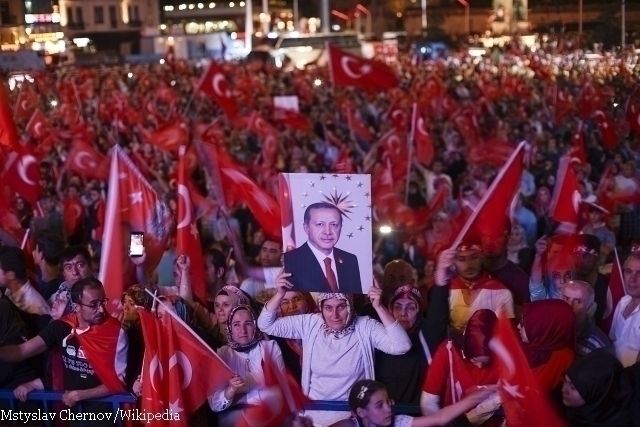Turkish Referendum: What‘s at Stake
Turkey held a referendum to strengthen presidential powers.

Corina Cristea, 21.04.2017, 13:01
The idea of a referendum on changes in the Constitution, in the sense of broadening the authority of the president to include executive powers as well, appeared in Turkey in the aftermath of the failed coup in the summer of 2016. The proposal followed the implementation of a purging policy targeting Erdogans opponents, from high-ranking military to magistrates or teaching staff. Despite warnings from Brussels, which cautioned that a constitutional referendum staged for the enhancement of president Erdogans powers would not help ease the already strained relations Turkey has with the EU, and might even put an end to Turkeys efforts to join the Community, the referendum was held on April 16. Erdogan and his supporters won by a narrow margin, with the results contested by the Opposition.
Eighteen amendments to the Constitution were subject to the vote, mainly concerning the prerogatives of the executive and the legislative. Among other things, they include the abolition of the position of Prime Minister. The president is to appoint the government and will have a number of vice-presidents, while Parliament will no longer have the right to table censure motions. Moreover, the president will be entitled to keep his political affiliation and will appoint 4 out of the 13 magistrates of the countrys supreme court. All these make the referendum the most notable political change in Turkey since the proclamation of the Turkish Republic in 1923.
The executive director of the Aspen Institute Romania Andrei Tarnea was a guest of Radio Romanias News and Current Affairs Channel. Andrei Tarnea spoke about the stakes of the Turkish referendum, starting off from a very specific demographic and cultural context, reflected in a society that has always been divided. Andrei Tarnea also mentioned that in Turkey, the constitution as it is today is the outcome of a military coup in the 1980s, which is why it has never been viewed by a part of the Turkish society as a legitimate document, working in the best interests of that country.
Andrei Tarnea: “Those who have never seen this document as a democratic one for the Turkish society come not only from the Islamist, conservative, traditional community, but also from Turkeys far left, which accounts for a major share of the voters in the countrys large cities. The Turkish society has evolved, in terms of make-up, demographic structure and cultural structure. The voice of this Anatolian part, more rural, more conservative, definitely more Islamist, more focused on religious values, has been gaining growing influence in the Turkish society over these past 10 years with Erdogan as PM or president.
This happened against the background of a notable economic performance, which overlapped the Erdogan Administration period, although it was not necessarily a result of it, but rather a consequence of closer ties between Turkey and the EU, of the Association Agreement and of growing foreign investments. How will the new changes be seen by the other part of society now, what will happen next with the two Turkeys? Pointing to the huge economic sway and the decision-making monopoly that the educated elite has in that country, Andrei Tarnea believes that some of the tensions that have been evident so far will likely go on:
Andrei Tarnea: “There is this educated urban elite, which hasnt always been free from what we would normally call ‘corruption and which has seized complete economic power in Turkey. It includes large economic clans, vertically integrated, with connections in the military and civilian systems, in politics, in the judiciary. And it has seen some resistance in the Turkish society, both from the left wing and from the more traditional communities. And these days this elite finds its legitimacy severely challenged. Today we see the classical division in society overlapping a new division, between modern, progressive Turkey, and Islamist, conservative Turkey. This fracture covers different foreign policy options and different options as regards the role of politics and the role of institutions and the future of the countrys culture. To make things even more complicated, in a difficult regional context, with Europe in crisis, the huge Turkish diaspora also has a say in all that. And we have seen the same division in Europe as well: while the large Turkish community in the Scandinavian countries and in the south of Europe overwhelmingly voted NO in this referendum, the new Turkish diaspora, coming particularly from Anatolia to Germany, the Netherlands and part of Austria voted YES.
Analysts see the referendum as a confidence vote for Recep Erdogan and the country that he wants to build. A country, they say, over which people have given him full control, in spite of the small difference between the number of opponents and the number of supporters of his absolutist ambitions. The main fear, from now on, is that the victory in this referendum may encourage Recep Erdogan to push for further constitutional changes and for the reintroduction of capital punishment.






























